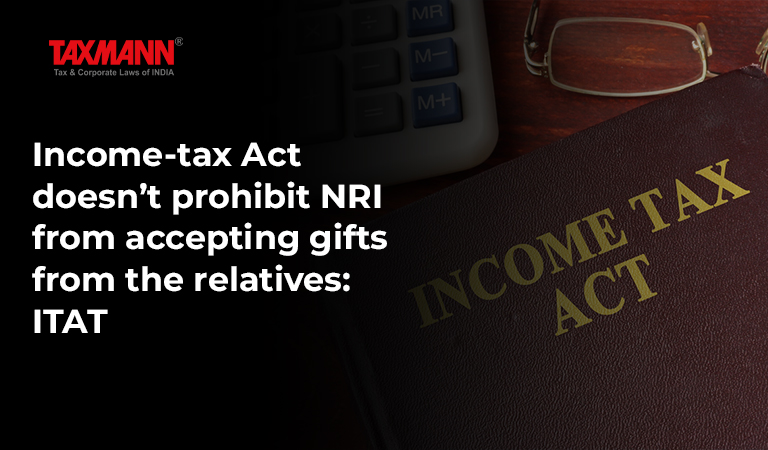Income-tax Act doesn’t prohibit NRI from accepting gifts from the relatives: ITAT
- Blog|News|Income Tax|
- 2 Min Read
- By Taxmann
- |
- Last Updated on 1 June, 2022

Case Details: Atul H. Patel v. ITO - [2022] 138 taxmann.com 454 (Ahmedabad-Trib.)
Judiciary and Counsel Details
-
- Waseem Ahmed, Accountant Member & Siddharatha Nautiyal, Judicial Member
- Parimal Sinh B. Parmar, A.R. for the Appellant.
- V.K. Singh, Sr. D.R. for the Respondent.
Facts of the Case
The assessee was a non-resident Indian (NRI) since 2003. There were cash deposits in his bank account amounting to Rs. 11.44 lakh. The Assessing Officer (AO) treated the same as undisclosed cash credit under section 68 and made an addition.
Before the CIT(A), the assessee submitted that he had received gifts from his father and brother. His father and brother are engaged in agricultural activities and generate an income of Rs. 23 lakhs approximately. The assessee submitted books of account and gift deed.
ITAT Held
However, the CIT(A) held that it is very unusual that a wealthy NRI is accepting gifts from his father and brother who are claimed to be agriculturists. Thus the order of the AO was to be held. Aggrieved-assessee filed the instant appeal before the Tribunal.
The Tribunal held that the assessee had discharged his onus by submitting the details that the cash was deposited out of the gift amount. Now the onus shifts upon the AO to disprove the contention of the assessee based on the documentary evidence.
However, it was found that there was no contrary evidence brought on record by the AO suggesting that the amount of cash deposit was not out of the gift amount. In other words, the revenue had not brought anything on record in support of its contention that the amount deposited by the assessee was not out of the cash gift.
Admittedly, it is very unusual that a wealthy NRI is accepting a gift from his father and brother. Generally, the practice is different in society as such NRI makes a gift to the relatives. But there is no prohibition for the NRI to accept gifts from the relatives. In the absence of any prohibition under the Income-tax Act, no adverse inference can be drawn against the assessee based on the prevailing system in the society.
Disclaimer: The content/information published on the website is only for general information of the user and shall not be construed as legal advice. While the Taxmann has exercised reasonable efforts to ensure the veracity of information/content published, Taxmann shall be under no liability in any manner whatsoever for incorrect information, if any.

Taxmann Publications has a dedicated in-house Research & Editorial Team. This team consists of a team of Chartered Accountants, Company Secretaries, and Lawyers. This team works under the guidance and supervision of editor-in-chief Mr Rakesh Bhargava.
The Research and Editorial Team is responsible for developing reliable and accurate content for the readers. The team follows the six-sigma approach to achieve the benchmark of zero error in its publications and research platforms. The team ensures that the following publication guidelines are thoroughly followed while developing the content:
- The statutory material is obtained only from the authorized and reliable sources
- All the latest developments in the judicial and legislative fields are covered
- Prepare the analytical write-ups on current, controversial, and important issues to help the readers to understand the concept and its implications
- Every content published by Taxmann is complete, accurate and lucid
- All evidence-based statements are supported with proper reference to Section, Circular No., Notification No. or citations
- The golden rules of grammar, style and consistency are thoroughly followed
- Font and size that’s easy to read and remain consistent across all imprint and digital publications are applied



 CA | CS | CMA
CA | CS | CMA
